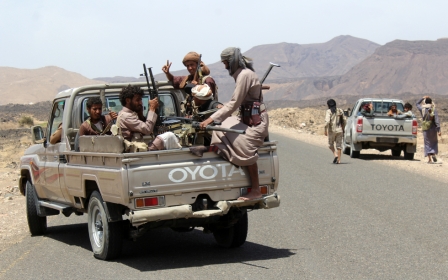Yemen government forces make key gains against al-Qaeda

By Fawaz al-Haidari
Yemeni troops backed by Arab coalition air strikes on Sunday recaptured a southeastern provincial capital held by al-Qaeda for the past year and an oil terminal, military sources said.
The gains come after pro-government forces began an offensive aimed at securing parts of the country captured by militants who have exploited a 13-month war between Gulf-backed loyalists and rebels supported by Iran.
The offensive coincides with UN-brokered peace talks in Kuwait after a ceasefire entered into effect on April 11, but from which the militant groups are excluded.
"We entered the city centre and were met by no resistance from al-Qaeda militants who withdrew west" towards the vast desert in Hadramawt and Shabwa provinces, a military officer said by phone from the city the militants seized last April.
The officer, who requested anonymity, said residents of Mukalla, home to about 200,000 people, had appealed to the militants to spare the city the destruction of fighting and to withdraw.
Yemeni military sources said Emirati military vehicles were used in the operation and that troops from the Gulf country, a key member of the Saudi-led coalition, were among the forces that entered Mukalla.
These reports could not be immediately confirmed by officials in the United Arab Emirates.
The Arab coalition battling Houthi rebels in Yemen since March 2015 carried out air strikes against al-Qaeda positions in Mukalla to pave the way for the ground troops, military sources said.
Troops also recaptured Mina al-Dhaba oil terminal in Shehr further east, the sources said.
Earlier Sunday, military sources said pro-government forces seized Riyan airport and an army brigade headquarters al-Qaeda had held for a year on Mukalla's outskirts.
Yemen-based al-Qaeda in the Arabian Peninsula (AQAP) is regarded by Washington as the network's most dangerous branch, and has carried out deadly attacks on the West in the past.
Last month, a US air strike on an al-Qaeda training camp in Hadramawt province killed dozens of fighters.
A provincial official in Shabwa said the militants also fled from the town of Azzan on Sunday, which they seized in February.
Bomb kills seven troops
As the anti-militant offensive gained momentum, a bomb-laden vehicle exploded Sunday, killing seven soldiers and wounding 14. They were in a convoy entering another southern militant stronghold - Zinjibar, capital of Abyan province, said military sources, blaming al-Qaeda for the attack.
The coalition, led by Sunni powerhouse Saudi Arabia, has deployed Apache helicopters to support loyalists fighting on the ground.
Forces loyal to internationally recognised President Abedrabbo Mansour Hadi's government have retreated from Zinjibar after entering it late Saturday, an officer in Abyan said.
"The withdrawal was decided following information that al-Qaeda was preparing other car-bomb attacks against our troops," added the officer who requested anonymity.
Government forces also launched an offensive Saturday to drive the militants from the neighbouring town of Jaar.
Fighting on Saturday killed 25 al-Qaeda fighters and four soldiers as loyalists seized al-Kud, five kilometres south of Zinjibar, military and medical sources said.
"After our withdrawal, Apache helicopters will target al-Qaeda positions to secure the town," said another officer, adding that helicopters had foiled two attempts to attack troops using vehicle bombs in al-Kud.
Similar assaults have pushed the militants from other areas in the south in recent months.
Coalition-backed forces have driven militants from Aden, the southern city declared by Hadi as Yemen's temporary capital after the Shia Houthi rebels overran Sanaa in September 2014.
And last week, government forces expelled AQAP militants from Huta, the provincial capital of Lahj.
When US President Barack Obama met Gulf leaders on Thursday in Saudi Arabia, they discussed the wars in Yemen and Syria.
During the visit, Ben Rhodes, one of Obama's closest advisers, urged all warring sides in Yemen to participate "constructively" in the Kuwait peace talks that began on Thursday, saying that a political solution would "allow for a focus on AQAP in Yemen".
Stay informed with MEE's newsletters
Sign up to get the latest alerts, insights and analysis, starting with Turkey Unpacked
Middle East Eye delivers independent and unrivalled coverage and analysis of the Middle East, North Africa and beyond. To learn more about republishing this content and the associated fees, please fill out this form. More about MEE can be found here.




